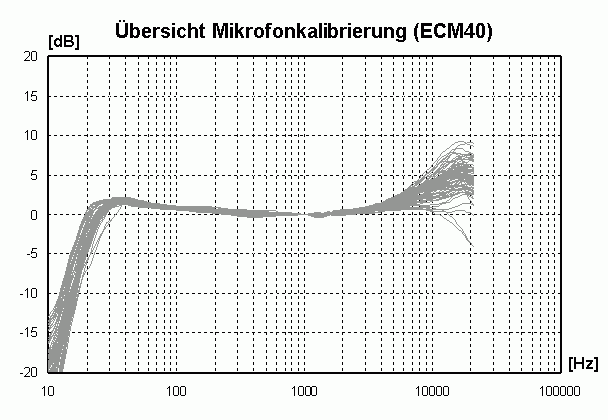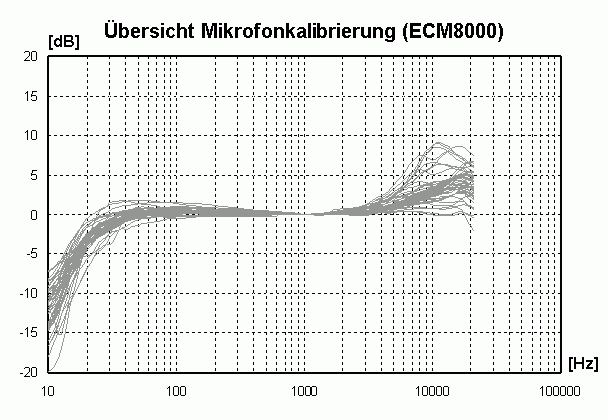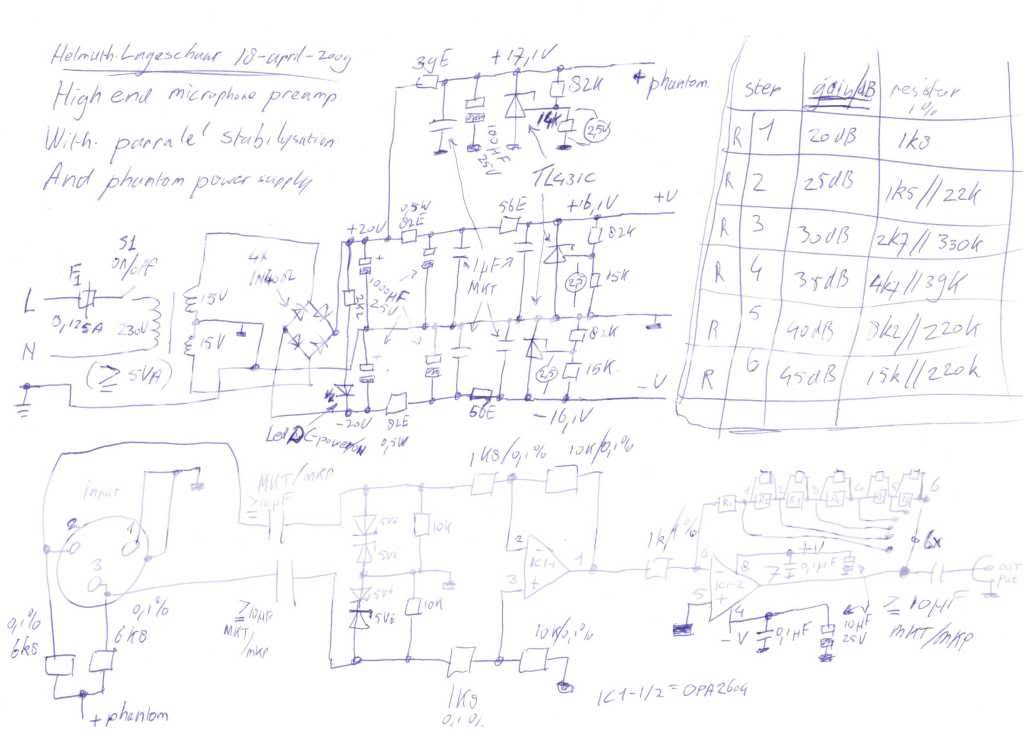I'm interested in assembling a measurement setup to serve dual purpose as a loudspeaker design tool and as a tool to optimally setup loudspeakers/subwoofers in rooms.
I have a Macbook Pro and plan on combining the Apogee Duet external firewire soundcard with Fuzzmeasure Pro acoustic software.
The last component of the measurement setup to be determined is the mic, of which there are several options.
Behringer ECM8000. Apparently Panasonic stopped producing the capsules for these microphones and they no longer include the previous output transformer. I haven't heard a lot of positive information over on gearslutz about these mics.
Earthworks M23/M30. Expensive ($500 for the M23), but nearly perfect omni mics.
http://www.earthworksaudio.com/28s.html
http://www.earthworksaudio.com/27.html
Calibrated DIY? I know from my experience in loudspeaker design that very capable systems are very possible. Would it be possible to DIY a mic that was equivalent to the M30 or even M50 for reasonable cost? Upon completion of the mic it would be calibrated of course. I know capsules are available, but are the bodies? Assuming bodies can be sourced, this begs the question ... which capsule to choose?
Has anybody completed a DIY mic kit? Was it worth it?
Thanks,
Thadman
I have a Macbook Pro and plan on combining the Apogee Duet external firewire soundcard with Fuzzmeasure Pro acoustic software.
The last component of the measurement setup to be determined is the mic, of which there are several options.
Behringer ECM8000. Apparently Panasonic stopped producing the capsules for these microphones and they no longer include the previous output transformer. I haven't heard a lot of positive information over on gearslutz about these mics.
Earthworks M23/M30. Expensive ($500 for the M23), but nearly perfect omni mics.
http://www.earthworksaudio.com/28s.html
http://www.earthworksaudio.com/27.html
Calibrated DIY? I know from my experience in loudspeaker design that very capable systems are very possible. Would it be possible to DIY a mic that was equivalent to the M30 or even M50 for reasonable cost? Upon completion of the mic it would be calibrated of course. I know capsules are available, but are the bodies? Assuming bodies can be sourced, this begs the question ... which capsule to choose?
Has anybody completed a DIY mic kit? Was it worth it?
Thanks,
Thadman
Monacor stageline
EMC40 many calibrations in one grafic

behringer emc8000

This i use with my behringer emc8000

There are also many soundkarts with phantom supply input.
EMC40 many calibrations in one grafic

behringer emc8000

This i use with my behringer emc8000

There are also many soundkarts with phantom supply input.
I have an ECM8000 and it is useless above 2kHz. The trouble is that I can't get it calibrated in Australia. The response is simular to the above post.
It would be good if there is one with reasonable price that is flat to 15kHz.
It would be good if there is one with reasonable price that is flat to 15kHz.
I just received some panasonic wm-61a modules
http://www.speakerbuilder.net/web_files/Articles/diymic/diymicmain.htm
gonna try doing that. Anyone else in here been down this route? impressions?
http://www.speakerbuilder.net/web_files/Articles/diymic/diymicmain.htm
gonna try doing that. Anyone else in here been down this route? impressions?
I've heard (from ZeroCool on this site) that Naiant makes some mics that are not only flat, but quiet and inexpensive.
http://www.naiant.com/studiostore/microphones.html
http://www.naiant.com/studiostore/microphones.html
I've built the linkwitz mic - its easy and cheap. AudioXpress has a recent article on its distortion profile (which is pretty decent), and Kim Girardin calibrated one for me for about $40. Highly recommend, very helpful guy. kmgrdn AT luminet DOT net
Total cost? Like $60 for a very nice calibrated mic. What more could you ask for?
Total cost? Like $60 for a very nice calibrated mic. What more could you ask for?
HiFiNutNut said:I have an ECM8000 and it is useless above 2kHz. The trouble is that I can't get it calibrated in Australia. The response is simular to the above post.
It would be good if there is one with reasonable price that is flat to 15kHz.
Same here in South Africa. I ended up buying a calibrated mic from Cross-Spectrum labs, and selling my old ECM8000 to a local DIYer.
See also the calibration report.
Calibration can be done down to 5Hz on request.
Shaun,
That is great. I am seriously tempted to buy one from them. But with shipment to Australia it would probably cost me AUD$200 upwards. I wish I don't need to care for money. It would be good if I knew this some months ago.
Sent emails to Kim for a couple of times but he never bothered to even reply.
Regards,
Bill
That is great. I am seriously tempted to buy one from them. But with shipment to Australia it would probably cost me AUD$200 upwards. I wish I don't need to care for money. It would be good if I knew this some months ago.
Sent emails to Kim for a couple of times but he never bothered to even reply.
Regards,
Bill
HiFiNutNut said:I wish I don't need to care for money.
Ah, tell me about it. I'm always having to come up with some scheme for supporting my audio & DIY habits.
Anyway, back to DIY:
I started off by building the Jason Neal mic preamp, and later modified the capsule to Siegfried Linkwitz's mod of the Panasonic capsule. The mod is intended to enable higher SPL measurement and lower distortion.
The earliest comments I heard regarding the Panasonic capsules (and I guess the same applies to ECM8000) said that it was flat enough where it matters. That is, in the typical crossover region. So one approach could be to only use these mics (if uncalibrated) in the, say, 200Hz to 10kHz region, and not worry about the data outside this region. This way you trust system response outside the 200Hz to 10kHz region, having selected good drivers and done careful LF design. What I actually did was to borrow a generic calibration file that I found floating on the net and used that...
Uncalibrated, the panasonic capsules often have a rising response starting somewhere around 4k, then being up about 3dB by 10k. That is an important region. My mic also had a very broad, 1dB bump in the midrange. Probably important too.
Take a look here:
http://home20.inet.tele.dk/audio/Measurement_Mic/microphone.htm
Think it works realy fine 😀
http://home20.inet.tele.dk/audio/Measurement_Mic/microphone.htm
Think it works realy fine 😀
Attachments
HiFiNutNut said:Helmuth,
Thanks. But mine has about 7-8dB peak at around 10-12kHz.
Regards,
Bill
???You can't know that.
Helmuth,
Well, since measurements with the ECM8000 I have from 2kHz up did not make any sense for me, I had to use simulations (BDS). From extensive experiments with BDS, it shows that my baffle response would be very flat from 3kHz upwards. Indeed, with most baffles the responses can only be flat at high frequencies. Mine has a large roundover of 70mm radius.
So I combined the baffle response with the tweeter response given by the manufacturer's datasheet (since baffle response for tweeters is flat so we can trust the datasheet) and derived my XO / EQ based on the modelling, rather than measurements. The result, subjectively, was very flat indeed. Basically, I couldn't hear any fault with it.
With the XO on and did the measurement, it showed 7-8dB peak at around 10-12kHz. That is how I knew it. Not 100%, but should be fairly close.
It is for this reason that I guess I will save the money not to buy a new mic, but to derive my mic response file from the data I have.
I hope this can serve as a tip to some.
Regards,
Bill
Well, since measurements with the ECM8000 I have from 2kHz up did not make any sense for me, I had to use simulations (BDS). From extensive experiments with BDS, it shows that my baffle response would be very flat from 3kHz upwards. Indeed, with most baffles the responses can only be flat at high frequencies. Mine has a large roundover of 70mm radius.
So I combined the baffle response with the tweeter response given by the manufacturer's datasheet (since baffle response for tweeters is flat so we can trust the datasheet) and derived my XO / EQ based on the modelling, rather than measurements. The result, subjectively, was very flat indeed. Basically, I couldn't hear any fault with it.
With the XO on and did the measurement, it showed 7-8dB peak at around 10-12kHz. That is how I knew it. Not 100%, but should be fairly close.
It is for this reason that I guess I will save the money not to buy a new mic, but to derive my mic response file from the data I have.
I hope this can serve as a tip to some.
Regards,
Bill
Perhaps I can give a simpler explanation.
At high frequencies the wave lengths are small comparing to the baffle width. So there is no "baffle step" to be concerned with. Sound transmits into 2pi space. Therefore, we should find the manufacturer's datasheets to be quite accurate at high frequencies. Of course, the result also depends on the baffle width.
Not so below about 3kHz where baffle effects start to show up and even worse, room effects may dominate lower frequency response due to the longer wave lengths.
At high frequencies the wave lengths are small comparing to the baffle width. So there is no "baffle step" to be concerned with. Sound transmits into 2pi space. Therefore, we should find the manufacturer's datasheets to be quite accurate at high frequencies. Of course, the result also depends on the baffle width.
Not so below about 3kHz where baffle effects start to show up and even worse, room effects may dominate lower frequency response due to the longer wave lengths.
mh..Panasonic capsule is interesting for diy in thailand. but i can't suggest thai diy because its not has a dealer in thailand.
HiFiNutNut now i use ecm 8000 and use caribrate file that i saw from the web. your good idea sometime i'll try.
🙂
HiFiNutNut now i use ecm 8000 and use caribrate file that i saw from the web. your good idea sometime i'll try.
🙂
HiFiNutNut said:Perhaps I can give a simpler explanation.
At high frequencies the wave lengths are small comparing to the baffle width. So there is no "baffle step" to be concerned with. Sound transmits into 2pi space. Therefore, we should find the manufacturer's datasheets to be quite accurate at high frequencies. Of course, the result also depends on the baffle width.
Not so below about 3kHz where baffle effects start to show up and even worse, room effects may dominate lower frequency response due to the longer wave lengths.
I discovered that all my three designs show a increase of spl at 12khz.
Although the frequency response data of the manufacturer is flat.
So my conclusion is the baffle increases the level at that point.
(I had to measure the loose tweeter to proof that. I can stil do that for two speakers)
- Status
- Not open for further replies.
- Home
- Loudspeakers
- Multi-Way
- DIY measurement mic
